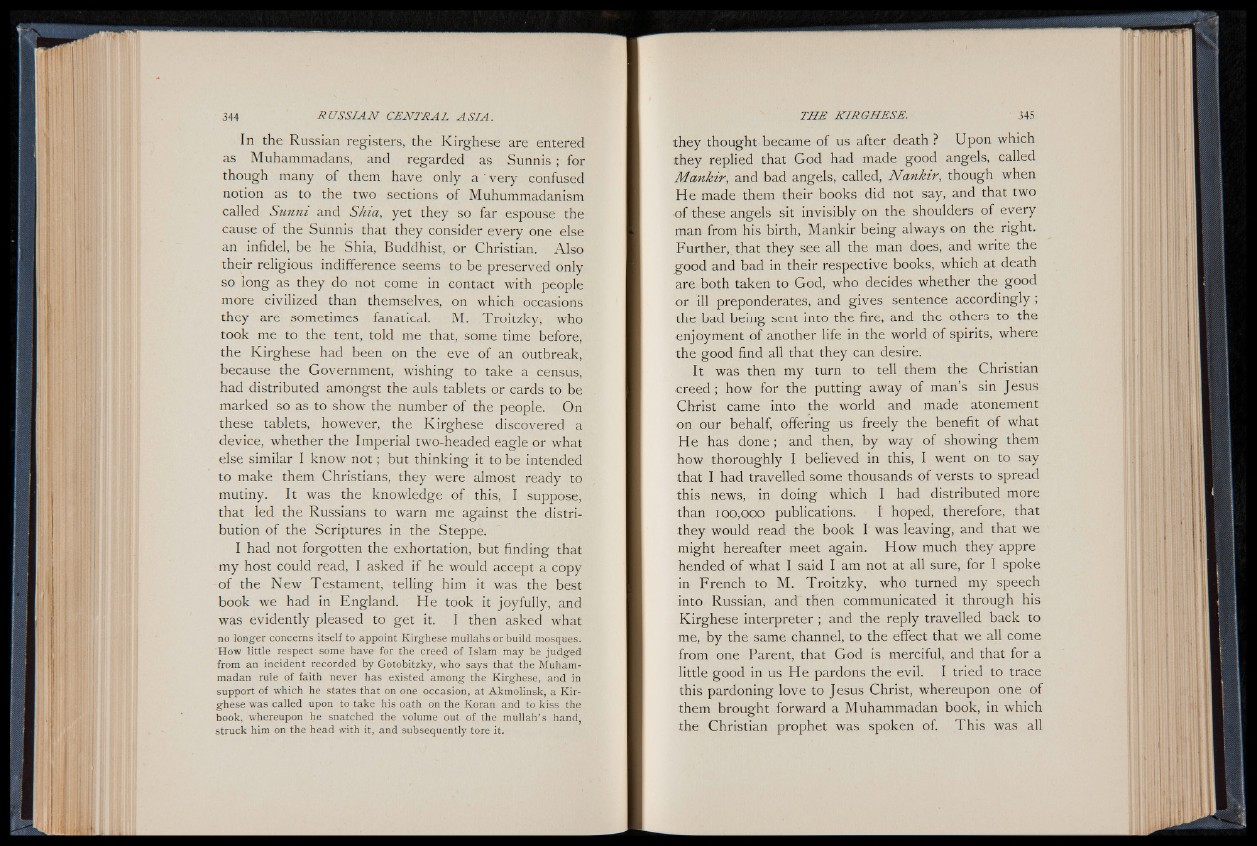
In the Russian registers, the Kirghese are entered
as Muhammadans, and regarded as Sunnis ; for
though many of them have only a 1 very confused
notion as to the two sections of Muhummadanism
called Sunni and Shia, yet they so far espouse the
cause of the Sunnis that they consider every one else
an infidel, be he Shia, Buddhist, or Christian. Also
their religious indifference seems to be preserved only
so long as they do not come in contact with people
more civilized than themselves, on which occasions
they are sometimes fanatical. M. Troitzky, who
took me to the tent, told me that, some time before,
the Kirghese had been on the eve of an outbreak,
because the Government, wishing to take a census,
had distributed amongst the auls tablets or cards to be
marked so as to show the number of the people. On
these tablets, however, the Kirghese discovered a
device, whether the Imperial two-headed eagle or what
else similar I know n o t ; but thinking it to be intended
to make them Christians, they were almost ready to
mutiny. It was the knowledge of this, I suppose,
that led the Russians to warn me against the distribution
of the Scriptures in the Steppe.
I had not forgotten the exhortation, but finding that
my host could read, I asked if he would accept a copy
of the New Testament, telling him it was the best
book we had in England. He took it joyfully, and
was evidently pleased to get it. I then asked what
no longer concerns itself to appoint Kirghese mullahs or build mosques.
How little respect some have for the creed of Islam may be judged
from an incident recorded by Gotobitzkv, who says that the Muhammadan
rule of faith never has existed among the Kirghese, and in
support of which he states that on one occasion, at Akmolinsk, a K irghese
was called upon to take his oath on the Koran and to kiss the
book, whereupon he snatched the volume out of the mullah’ s hand,
struck him on the head with it, and subsequently tore it.
they thought became of us after death ? Upon which
they replied that God had made good angels, called
Mankir, and bad angels, called, Nankir, though when
He made them their books did not say, and that two
of these angels sit invisibly on the shoulders of every
man from his birth, Mankir being always on the right.
Further, that they see all the man does, and write the
good and bad in their respective books, which at death
are both taken to God, who decides whether the good
or ill preponderates, and gives sentence accordingly;
the bad being sent into the fire, and the others to the
enjoyment of another life in the world of spirits, where
the good find all that they can desire.
It was then my turn to tell them the Christian
creed; how for the putting away of man’s sin J esus
Christ came into the world and made atonement
on our behalf, offering us freely the benefit of what
He has done ; and then, by way of showing them
how thoroughly I believed in this, I went on to say
that I had travelled some thousands of versts to spread
this news,, in doing which I had distributed more
than xoo,ooo publications. I hoped, therefore, that
they would read the book I was leaving, and that we
might hereafter meet again. How much they appre
hended of what I said I am not at all sure, for I spoke
in French to M. Troitzky, who turned my speech
into Russian, and then communicated it through his
Kirghese interpreter ; and the reply travelled back to
me, by the same channel, to the effect that we all come
from one Parent, that God is merciful, and that for a
little good in us He pardons the evil. I tried to trace
this pardoning love to Jesus Christ, whereupon one of
them brought forward a Muhammadan book, in which
the Christian prophet was spoken of. This was all